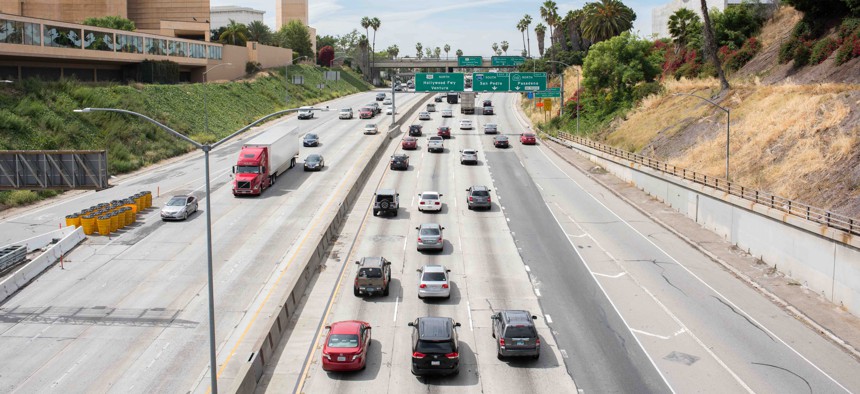‘You're Not Going to See a Gas Tax Increase. It's Just Not Gonna Happen.’

U.S. Highway 101 in downtown Los Angeles, during April 2017. Shutterstock.com / Michael Gordon

Connecting state and local government leaders
House lawmakers mull road and transit issues as they wait for the Trump administration’s infrastructure plan.
WASHINGTON — The odds are low that Congress will act in the months ahead to raise the federal gas tax in order to help pay for transportation infrastructure, according to the chairman of a U.S. House panel on highways and transit.
“You're not going to see a gas tax increase. It's just not gonna happen,” Rep. Sam Graves, a Missouri Republican, told reporters Wednesday after a meeting of the House Transportation and Infrastructure subcommittee on Highways and Transit, a panel which he chairs.
Graves made his comments in response to a question about his position on raising the tax to help shore up the Highway Trust Fund, a key source of federal dollars for road and transit projects.
Much of the money for the fund comes from taxes on gas and diesel fuel. These revenues have declined as vehicles have become increasingly fuel efficient. More electric, shared and automated vehicles could further erode fuel tax revenues in the years ahead.
The federal gas tax has been flat for over two decades at 18.4 cents per gallon, equivalent to its level in 1993. The federal tax rate for diesel is 24.4 cents per gallon.
Congressional Budget Office projections show the trust fund will not be able to meet its obligations beyond the 2020 fiscal year. The fund’s 10-year shortfall is currently about $143 billion, based on CBO estimates.
If lawmakers don’t address this gap, the U.S. Department of Transportation might need to take steps like rationing reimbursements to states in order to maintain an adequate balance for the fund, creating the risk that transportation projects could be delayed.
Graves said an option he favors for stabilizing future road-user revenues is a tax on vehicle miles traveled. A number of states, including California, Oregon and Washington have implemented programs to experiment with these sorts of charges.
'All We’re Doing is Talking'
Discussions about the health of the Highway Trust Fund come as the Trump administration is working on an infrastructure investment plan. But, nearly nine months into the president’s term, the White House has yet to release a formal, detailed proposal.
Administration officials have indicated the plan will involve $200 billion of federal investment over a decade. This money, they say, could be combined with state, local and private dollars with the aim of reaching $1 trillion in total investment.
Graves said it is still unclear how issues tied to the Highway Trust Fund might factor into a broader infrastructure package. “They’re connected but they’re also, they’re separate issues,” he said.
As for the timing of when the administration might release its plan, Graves said: “It could be this week, it could be next week, it possibly could be the week after.”
Rep. Peter DeFazio, an Oregon Democrat and the full House Transportation and Infrastructure Committee’s ranking member, blasted the amount of progress Congress and the White House have made on infrastructure legislation. He noted that about two dozen states had enacted recent measures to raise revenues for transportation costs, primarily through state gas tax hikes.
“Why are we sitting here jawing again today, nine months, 10 months into the year after the first hearing on our infrastructure needs, with no proposals other than a few introduced by people like myself?”
“We can do this in a bipartisan way, but all we’re doing is talking. That’s all we’re doing around here,” DeFazio added. “It’s time to put proposals out and push the House to act.”
Graves said work is happening within the committee to develop a “basic framework” for infrastructure legislation.
“But obviously this is an administration priority,” he added. “We’re going to wait for them to come forward with their ideas.”
'Asset Recycling'
Rep. Bill Shuster, a Pennsylvania Republican who chairs the Transportation and Infrastructure Committee, said during Wednesday’s hearing that lawmakers should consider a model used in Australia to attract private money toward public works.
The approach is known as “asset recycling.” It involves leasing or selling existing public infrastructure to private partners and using the lease or sale proceeds to fund new projects.
“Public-private partnerships are not a silver bullet,” Shuster said.
But he added that there are "trillions of dollars" investors would like to put into American infrastructure projects. "And they’re not looking for an eight and 10 percent return.”
Critics of asset recycling warn that it can result in problematic, long-term contracts and deals that are effectively expensive loans for governments and, in turn, payers of taxes, fees and tolls.
DeFazio said that at best public-private partnership deals might be able to cover about 10 to 12 percent of the nation’s infrastructure needs and “that still leaves a hell of a lot on the table.”
Rewarding 'Self-Help'
Peter Rogoff, CEO of Sound Transit, an agency that provides bus and rail service in the Seattle metropolitan area, was among those who testified before the subcommittee Wednesday.
He pointed out that traffic congestion has nearly doubled in the past five years in the region. And he said it is “not an accident” that Amazon, now headquartered in Seattle, is considering the availability of rail transit as it seeks a location for a second headquarters.
Rogoff also pointed out that the federal share of Sound Transit’s voter-approved capital plan is only 16 percent.
“The taxpayers of Washington state have demonstrated remarkable levels of self-help to meet their surface transportation needs,” he added, noting the state’s gas tax is the second-highest in the U.S. “Any federal infrastructure policy should reward this level of local effort.”
Bill Lucia is a Senior Reporter for Government Executive’s Route Fifty and is based in Washington, D.C.

NEXT STORY: Cord-cutting for the enterprise





